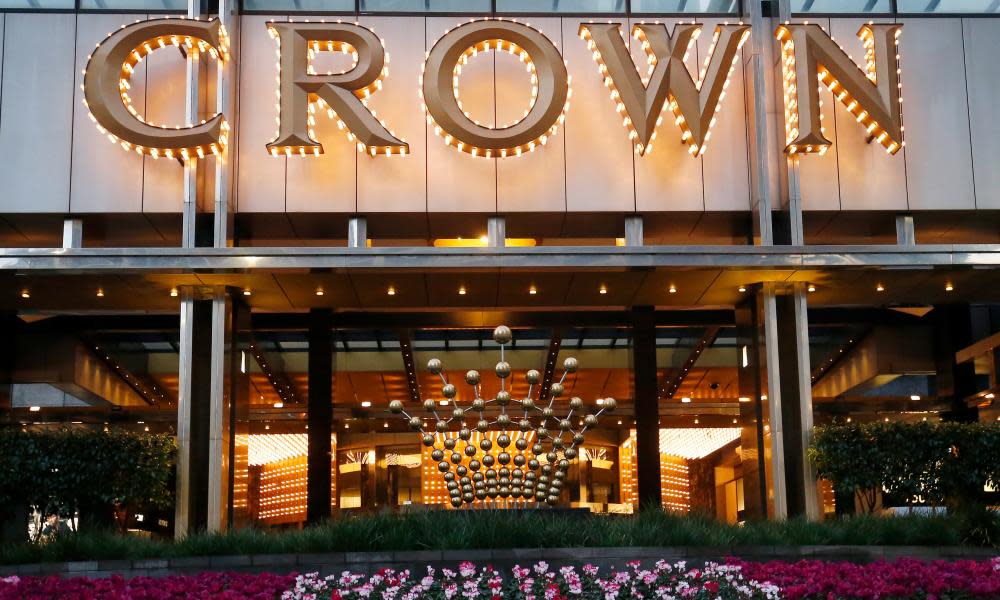Crown inquiry told Australia has less-stringent controls on casino junkets than elsewhere

An inquiry into allegations of money laundering at Crown Resorts Melbourne casino has heard that other jurisdictions have far more stringent controls on junkets which bring high rollers to casinos.
On the first day of evidence in a NSW inquiry, a gaming expert, Paul Bromberg from Spectrum Asia, said that other countries such as Singapore – and US gaming states such as New Jersey – required junket operators to be licensed.
Japan had decided to ban them operating in casinos entirely.
The inquiryis being chaired by the former supreme court judge Patricia Bergin and is examining allegations of money laundering and links to organised crime in Crown. She is also considering whether there are probity issues raised by Lawrence Ho’s Melco Resorts’ purchase of 10% of Crown’s shares.
Related: 'This is new territory': Australia's powerful Crown casino faces scrutiny like never before
Reports in the Sydney Morning Herald and the Age last year alleged that Crown Resorts, part-owned by one of Australia’s richest men, James Packer, was using junkets backed by Asia’s most powerful organised crime syndicates as part of its program to attract Chinese high rollers to its casinos.
Reports also alleged that Crown’s casinos were used to launder money.
Bromberg told the inquiry there was substantial work by academics which linked Macau’s junkets – organisations which bring high rollers to overseas casinos – to the triads.
Bromberg said that as well as organising travel, junket operators arranged prostitutes and narcotics for their clientele and also provided cross-border finance and enforced debts. The enforcement of gaming debts is illegal in China.
“For all these reasons, organised crime has been involved in junkets for many years,” he said.
He said there had been reports in the Hong Kong media about the organised crime connections of Suncity, including the CEO, Alvin Chau.
Related: Crown Resorts may have breached casino licence over proposed share deal with Melco, inquiry hears
The allegations drew a sharp response from Crown, which ran advertisements in newspapers calling the reports a “deceitful campaign”.
Crown pointed to registration of junkets by the gaming authorities in Macau and the fact that the largest junket Crown was involved with, Suncity, is listed on the Hong Kong stock exchange.
But Bromberg, a veteran of the Asian gaming scene, said the fact that Macau registered junket operators offered “little comfort”.
He said until recently Macau had failed to enforce its own gaming legislation and that registration was very different from enforcement. Macau merely required junket operators to certify that they had no foreign criminal connections, without doing its own checks, he said.
Asked what comfort could be gained by a junket like Suncity being listed on the Hong Kong stock exchange, Bromberg replied: “I would say very little.”
He said that apart from limited financial scrutiny, the HK stock exchange did not have the resources for probity checks of any companies listed on its bourse, and that applied equally to companies not in the gaming industry.
On the other hand, Singapore, which opened its first two casinos in 2010, required junkets to be licensed, he said. Its regulator, which has the powers of a law enforcement body, had rejected several junket operators because they did not meet probity checks, he said.
Bromberg said Japan had gone further and taken the decision not to allow junkets to operate in its gaming industry.
Australian casinos are required to notify the state casino authorities if they are using junkets to promote their casino or allowing them to operate within the casino.
But the authorities do not run probity checks on the junkets, leaving that function to the casino itself.
Bromberg said this clearly gave rise to a potential conflict of interest, as the casino was wanting to bring as many wealthy VIPs to its casino as possible.
Also he pointed out that casinos did not have access to information gathered by other law enforcement agencies.
The regulation of Macau’s gaming scene is particularly relevant to Crown because Macau’s Melco Resorts, chaired by Lawrence Ho, has bought a 10% stake in Crown. However, Ho recently announced he would not proceed to buy a further 10% from Packer due to the downturn caused by the coronavirus outbreak.
Packer is expected to give evidence in the second part of the inquiry in March.


